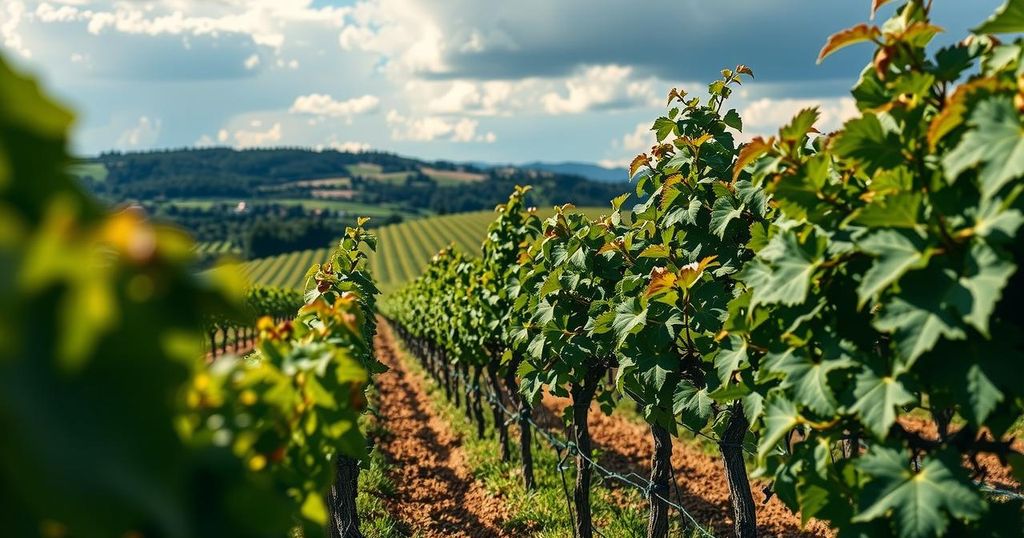Climate change
economics
Technology
AGRICULTURE, AMAZON, ARGENTINA, ASIA, AZERBAIJAN, BAKU, BRAZIL, CATENA - ZAPATA WINES, CATENA INSTITUTE OF WINE, CLIMATE CHANGE, CUYO NATIONAL UNIVERSITY, ECONOMICS, EUROPE, ITALY, JOE BIDEN, LAURA CATENA, LUCA WINES, MALBEC, SOUTH AMERICA, TERROIR CONGRESS, UN, WINE INDUSTRY, WINE TASTING, WINES OF ARGENTINA
Fatima Khan
0 Comments
Global Climate Change Discussion Shifts to Winemaking and Sustainability
The recent climate discussions at COP 29 in Azerbaijan and the International Terroir Congress in Mendoza, Argentina, highlighted the profound challenges posed by climate change on global winemaking. High-profile figures like President Biden emphasized environmental conservation, while local experts and winemakers discussed adaptations needed in the face of rising temperatures and water scarcity. A unified approach among growers and researchers is essential for sustaining this vital industry as climate pressures continue to grow.
This week, climate discussions intensified in Baku, Azerbaijan, during the UN’s COP 29, where developing nations pressed the hesitant leaders of the United States and Europe for substantial investments to combat climate change. Concurrently, in Brazil, G-20 leaders met, with President Joe Biden becoming the first U.S. President to visit the Amazon, emphasizing the region’s ecological significance and announcing November 17 as International Conservation Day. Meanwhile, in Mendoza, Argentina, locals voiced their concerns about climate change’s impact on winemaking, a vital part of their culture, during the International Terroir Congress held there for the first time since 1996.
Dr. Laura Catena, a leading figure in Mendoza’s wine industry, highlighted the integral connection between wine and Argentine culture. Mendoza is renowned for its unique Malbec production and serves as a significant player in the international wine market, with exports reaching approximately $844 million in 2021. The environmental challenges posed by climate change and evolving weather patterns are now critical topics among the over 230 international attendees at the congress, including researchers and vineyard owners.
Notably, viticulturist Kees Van Leeuwen underscored the multifaceted nature of ‘terroir’, where climate emerges as a pivotal factor influencing wine quality. Greg Jones, a climatologist, shared insights on the limitations imposed by climate variability on grapevines, emphasizing that temperature shifts necessitate changes in grape varieties, a challenging adjustment for established wine regions.
As Mendoza’s vineyards face increasing water scarcity, Fernando Buscema from the Catena Institute of Wine emphasized the need for collaborative strategies to adapt to these climatic pressures. The institute works to exchange knowledge on sustainable vineyard practices across harsh environments globally, emphasizing the importance of teamwork in addressing the multifaceted challenges brought on by climate change.
The article addresses the growing concern of climate change and its implications for agricultural industries, particularly winemaking, in various regions. As global leaders convene to discuss climate policy and funding during COP 29, grassroots responses from local communities, such as those in Mendoza, Argentina, spotlight the urgency of these issues. The long-standing cultural significance of winemaking in Argentina intersects with modern challenges posed by climate change, highlighting the need for adaptation and collaborative solutions in the wine industry.
The discussions at COP 29 and the International Terroir Congress illuminate the urgent need for significant investment in climate change mitigation and adaptation strategies. As wine regions like Mendoza confront the realities of climate evolution, the collaboration among scientists, winemakers, and local communities will be crucial in ensuring the resilience of this beloved industry. The integration of sustainable practices and innovative solutions appears paramount to navigate the complex interplay between climate change and agricultural productivity, especially in regions historically committed to their winemaking heritage.
Original Source: www.forbes.com




Post Comment